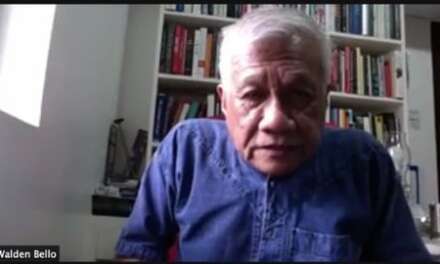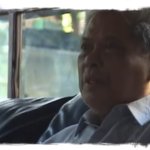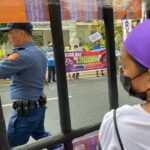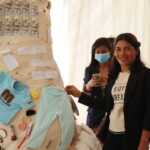By Shalmali Guttal
It is possible that the G-8 summit in Genoa will be remembered by many, more for the violence on the streets than for the duplicity of the G-8 leadership, or for the substantive challenge mounted by the largely peaceful anti-globalisation movement.
Since July 19, the international press has carried numerous commentaries on the street demonstrations and protests gone amok in Genoa. Most of them have been quick to denounce the tactics of the alleged “Black Bloc” and highlight perceived “splits” in the anti-globalisation movement. But few of these commentaries have directed serious attention to why more than a 100,000 people gathered in Genoa to protest the G-8 Summit, or why there is such a large and diverse anti-globalisation movement to begin with. And almost none have questioned the role and tactics of the G-8’s security forces in creating an enemy that they can then justify attacking. one of the more objectionable commentaries was by Fareed Zakaria in the International Herald Tribune on July 24, 2001. Mr. Zakaria (who is Editor of Newsweek International) champions the technological revolution as the only “realistic solution” for the “desperate condition of poor countries” and argues against an imagined (by him) “anti-technology bias” among the G-8 protestors in Genoa.
This is nothing new. As a member of the anti-globalisation movement I have been accused of being “anti-trade,” “anti-development,” and “anti-technology” several times over. What makes Mr. Zakaria’s commentary particularly shocking are remarks by Mr. Mark Malloch Brown, the UNDP Administrator, from which Mr. Zakaria seems to draw considerable strength for his own arguments. Using the UNDP’s latest Human Development Report as his information source, Mr. Zakaria extols the virtues of DDT and genetically modified (GM) foods, and argues that it is wrong to pressure poor countries to stop using dangerous chemicals or products that are already prohibited in developed countries because concerns about their side effects. He then quotes Mr. Mark Malloch Brown: “It’s unfortunate that the protestors have an anti-technology bias,” and further, “Not one person anywhere has died by eating genetically modified food.” Mr. Brown seems to have missed some of the key points in the GM food debate, but we can set that aside for now. The article gets worse as Mr. Brown then goes on to point the way for the anti G-8 protestors: “The Protestors should reflect on the symbolism of Genoa. It’s the birthplace of Christopher Columbus, one of the greatest explorers in history.
They could either follow in the footsteps of Columbus, who showed that embracing innovation and taking risks could have unimaginable benefits. Or else they could just become the latest members of the ‘flat earth society,’ opposed to modern economics, modern technology, modern science and modern life itself.” By protesting against the G-8 Summit in Genoa, activists were indeed reflecting on the symbolism of Genoa and the legacy of Christopher Columbus’ “innovations” and “risk taking.” Columbus was a merchant clerk from Genoa who persuaded the Spanish monarchy to finance an expedition to Asia in search of gold and spices. In return for the booty, the monarchy promised him 10 percent of all profits, governorship over newfound lands and the title: Admiral of the Ocean Seas.
Columbus never made it to Asia, but his forays led to the colonisation of the Americas, and the destruction of entire local populations, eco-systems and social systems. Spain and Europe certainly reaped unimaginable benefits. But for the native peoples of the Bahamas and Latin America, Columbus brought syphilis, brutality and centuries of exploitation in the name of progress and enlightenment. His contempt for those unlike him is evident in his log. When describing his first meeting with the Arawak Indians, he says: “They brought us parrots and balls of cotton and spears, and many other things, which they exchanged for the glass beads and hawks’ bells. They willingly traded everything they owned. . . . They were well built, with good bodies and handsome features. . . . They would make fine servants…With fifty men we could subjugate them all and make them do whatever we want.” And further, “…on the first island which I found, I took some of the natives by force in order that they might learn and might give me information of whatever there is in these parts.” Columbus and his cohorts were certainly successful in subjugating the natives. Motivated by greed and personal glory, and under the banners of Christianity, Europe and progress, they wiped out at least 3 million Indians in the lands that are now Cuba, Haiti and the Dominican Republic. In the words of Bartolome de Las Casas, a Spanish priest who became a vehement critic of the Spanish expeditions and transcribed Columbus’ journal: ” . . . in a short time this land which was so great, so powerful and fertile…was depopulated…My eyes have seen these acts so foreign to human nature, and now I tremble as I write . . . from 1494 to 1508, over three million people had perished from war, slavery and the mines . . . Who in future generations will believe this? I myself writing as a knowledgeable eyewitness can hardly believe it. . . .”
Quite a role model. And promoted by the Head of an organisation charged with championing the cause of the world’s poor! Christopher Columbus’ footsteps lead in the direction of unbridled greed, racism, colonialism, religious intolerance, conquest, slavery and death. It is indeed a matter of pride that that the protestors in Genoa choose not to follow in these footsteps. on the other hand, Mr. Brown’s choice of an avaricious, self-serving colonialist as a role model is certainly an outrage.
Mr. Brown would also do well to remember that the origins of flat earth believers go back to the inquisitors of the Dark Ages who persecuted Galileo Galilei for daring to challenge the dominant beliefs of his times. In Genoa this July, thousands of modern day Galileos who dared to challenge the dominant beliefs of our times were persecuted by the inquisitors of the G-8. And it might surprise Mr. Brown to learn that a number of peasant organisations in the South, unfortunate inheritors of Columbus’ legacy of innovation and risk taking, have issued a call to burn the UNDP’s Human Development Report 2001.
The Genoa Summit was heralded by the international media and G-8 spokespersons as the first G-8 Summit of the millenium and marketed as an anti-poverty summit. What came out of it? A commitment of US $ 1.2 billion for a global health fund to fight AIDS and other diseases, which fell far short of the US $ 7-10 billion called for by the UN Secretary General and others in the health field. Yet another plan to fight poverty in Africa (aptly titled the Africa Marshall Plan), which pushes further economic liberalisation and privatisation on African countries with new conditionalities through instruments of “governance.” And the usual assortment of platitudes about democracy, partnership, human rights, security, debt relief, etc. Even the decision to launch a new Round of Trade Negotiations was no surprise. Meanwhile, annual G-8 events have become increasingly extravagant and costly with sumptuous meals and luxurious living. They have also become high profile media events with thousands of delegates and journalists. The G-8 Summit in Okinawa cost over US $ 760 million and investigations over the past year have reported rampant corruption in planning and procurement expenditures for the Summit’s events. The dollar price of the Genoa Summit is still to be tallied, but the Italian Government says they spent US $ 110 million, and property damage from the protests amounts to US $ 20 million. But the United States alone had at least 600 people in its delegation, while other countries averaged about 350 people per delegation. Who will pay for them? And who will pick up the tab for the massive security arrangements to protect these eight elected leaders from their electorates?
As Summit delegates were fudging around with their pre-prepared texts on democracy, human rights and security, the Italian Police, aided by security agencies of other G-8 members, launched a sweeping and draconian mop-up operation of activists who they identified as security threats. The violence on the streets was just the beginning–that was for television. What the television cameras did not see was the attacks on schools and other shelters that started on July 21 and are continuing even today. Any site even vaguely perceived to be connected with the anti-globalisation movement has been raided across the country. People are being violently rounded up, arrested and intimidated without due legal process, and denied medical assistance.
Reports from Italy indicate that there have been at least three fatalities, two people are in coma, hundreds have been tortured and beaten, dozens are in hospital and at least 200 activists are still missing. All this is the doing of the G-8 leadership–the very same group of men who make loud noises about upholding democracy, fighting poverty, disease and hunger, and promoting social inclusion. Perhaps another reason I find Mr. Brown’s remarks about the protestors in Genoa so disturbing is because they remind us that the spirit of Columbus lives on in the G-8. Their institutional armies will go to tremendous lengths to protect their access to modern-day forms of gold, spices and servants. In a bid to avoid further challenges to who they are and what they do, the G-8 leaders will scuttle off to Kananaskis in a remote corner of Canada for the 2002 Summit. But Mr. Brown can rest assured, this is one group of footsteps that the anti-globalisation movement will certainly not give up on.
End Notes
1.Real Street Smarts For G-8 Protestors, by Fareed Zakaria, International Herald Tribune, July 24, 2001.
2. Ibid.
3. A People’s History of the United States, by Howard Zinn, Harper Perennial, 1990.
4. Ibid.







